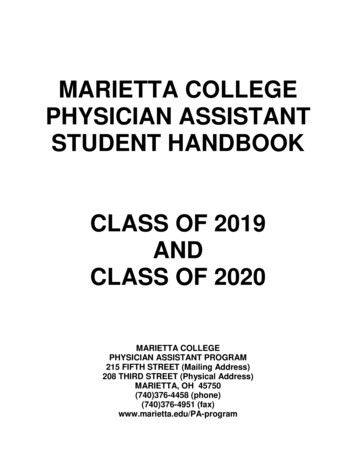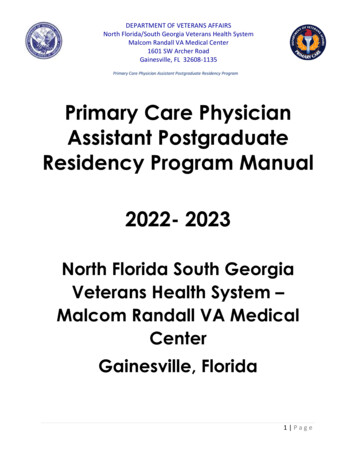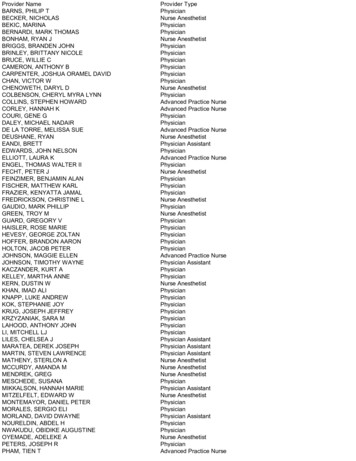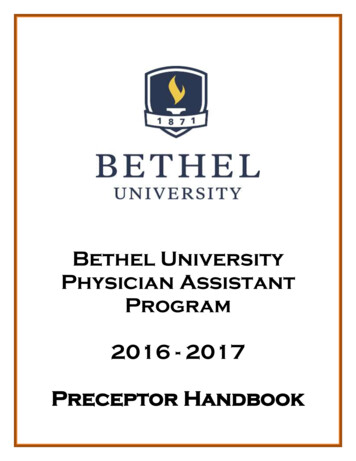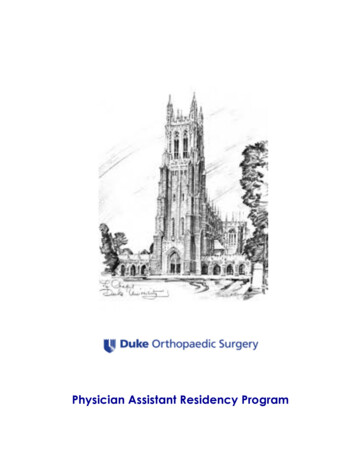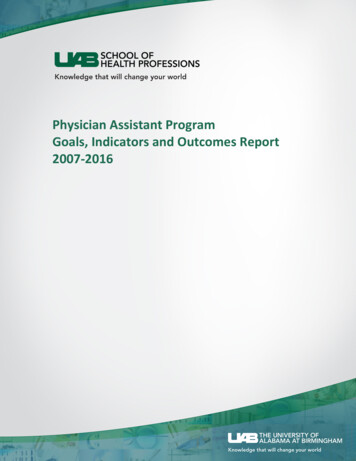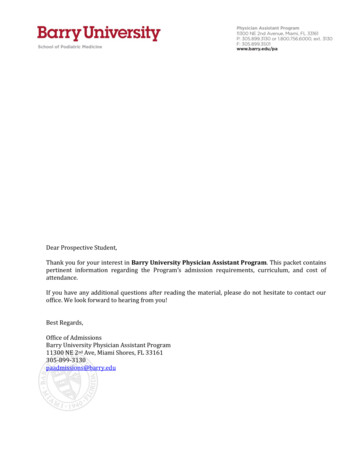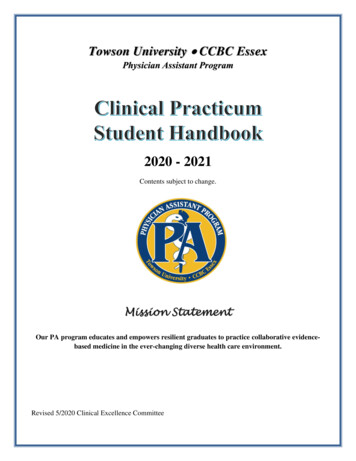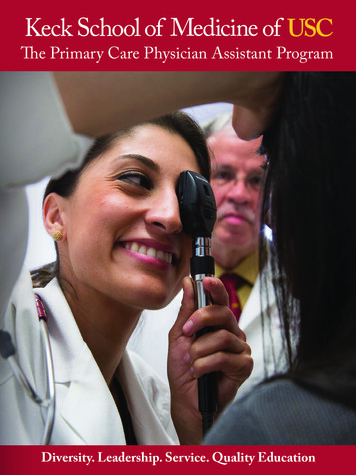
Transcription
The Primary Care Physician Assistant ProgramDiversity. Leadership. Service. Quality Education
“With the shortage of primary care physiciansand the expanding patient population.PAs are poised to becomeprominent leaders.”Kevin C. Lohenry, Ph.D., PA-CProgram DirectorThe Master of Physician Assistant Practice (MPAP), offered by the Primary CarePhysician Assistant Program at Keck School of Medicine USC, trains students ina range of medical, social and behavioral sciences required for clinical practice.The 33-month graduate curriculum includes integrated course work in the basicsciences, medicine, clinical skills, public health and epidemiology, health careadministration and psychosocial and behavioral sciences. Our unique locationwithin the Keck School of Medicine of USC provides students with a vast arrayof educational and clinical resources that contribute to excellence in training.The Primary Care Physician Assistant (PA) Program is dedicated to theadvancement of physician assistant education and emphasizes care for themedically underserved. The program is committed to preparing students froma wide variety of backgrounds to practice medicine with the supervision of aphysician.The program places great importance on collaboration. By creating an innovativelearning environment, we are giving PA students all the tools they need to beleaders in the field of health care and to advocate on behalf of their patients andprofession.
Why be a Trojan PA?With a diverse makeup of students and faculty, the Primary Care PA Program is aunique experience that you won’t find anywhere else. We offer students Medical Spanish courses to help them enhance their abilityto practice medicine in Spanish-speaking neighborhoods. It is vital that healthcare providers be able to build relationships with their patients and speaking thelanguage is key. Our graduates report a doubling in their language confidence at thecompletion of the course. Students engage in a great deal of volunteer work and service to the community.New students begin orientation with a day at the Los Angeles Regional Food Bankand current students are active in the Student-Run Clinic, where they volunteertheir time to offer medical services to the greater community. Our students are leaders. Every spring, students are invited to advocate inWashington D.C., where they meet with congressional representatives and advocacygroups to speak on behalf of their patients and profession. Students also areinvolved in many on campus groups, where they lead projects alongside medical,pharmacy and students from other disciplines. As part of our program, we alsopromote membership to the American Academy of Physician Assistants (AAPA)and the California Academy of Physician Assistants (CAPA) to help our studentslearn about advocating for the profession and their future patients. The program offers one-of-a-kind innovation with our Director of InnovativeLearning, who guides the way for students to become leaders in the field. Ourclassrooms include top of the line technology and our faculty are trained to promotelearning that focuses on collaboration and building a critical thinking skill set, sothat when students graduate they are better prepared to meet the challenges theyface in practice.
Admission RequirementsSciences:One-year sequential coursework for science majors in: General Biology with lab (usually 1 semester each of cellular biology andorganismal biology or 3 quarters of cellular, organismal, and evolutionarybiology) General Chemistry with lab (2 semesters or 3 quarters of inorganic chemistrywith quantitative analysis)3 semester units or 4 quarter units of each of the following: Human Anatomy with lab Human Physiology with lab General Microbiology with labNon-Sciences:3 semester units or 4 quarter units of each of the following: Statistics, preferably statistics for psychology, sociology or biology. Introduction to Psychology2 semester units or 3 quarters of Beginning Spanish LanguageInternational applicants must have also completed 2 semester units or 3 quarters ofEnglish Composition.What makes a strong candidate? Community Service - Non-healthcare related volunteer experience(Interviewees average 671 hours)Cumulative GPA - Interviewees averaged 3.5Science GPA - Interviewees averaged 3.41GRE or MCAT- Interviewees average 1167 (old version) or 307 on the newGRE and 28 on the MCATClinical experience - Paid patient care experience highly-recommended, but notrequired. Interviewees average 2, 263 from both paid and volunteer experience.PA shadowing experience - Interviewees averaged 20 hoursResearch experienceLaboratory experienceHealthcare volunteer experienceInterview (selected applicants only) - Knowledge of PA profession, leadershippotential, communication/interpersonal skills, professionalism, personalattributes and program fit.
Program CurriculumThe program is a full-time educational and professional training program.Students have the opportunity to learn from instructors, including, physicianassistants, nurse practitioners, doctors, occupational therapists, social workersand pharmacists. Based on the unique curriculum offered at the Primary CarePA Program at the Keck School of Medicine of USC, our students enter theworkforce having spent more time in each rotation.Year 1Fall: Basic Medical Sciences; Behavioral Sciences I; Clinical Skills I and Topicsin Medicine I.Spring: Behavioral Sciences II; Clinical Skills II; Topics in Medicine II.Year 2Fall: Behavioral Sciences III; Clinical Skills III; Topics in Medicine IIISpring: 18 weeks of Clinical Clerkships; Post-Clinical Activities (return tocampus for lectures & testing)Summer: 12 weeks of Clinical Clerkships; Post-Clinical Activities(return to campus for lectures & testing)*Year 3Fall: 18 weeks of Clinical Clerkships; Post-Clinical Activities (return to campusfor lectures & testing)Spring: Advanced Clinical Skills IV; Advanced Education; Advanced Research;Medical Care Organizations; Senior Clinical Clerkships( 250 hours).*Students will have completed about 2,000 hours of clinical time before they graduate.
Student Perspective“I chose USC because it was the one school,where I felt like I could get aworld-class educationand also a hands on experience in adiverse community.”- Judith Onyepunuka, Class of 2018“Working with people of all walksof life has always been importantto me and I really felt that USCencompassed that in their missionstatement. I am from an underservedcommunity, so it has always beenimportant to me that I give back tocommunities similar to where I camefrom.When I interviewed here, I feltlike this was my dream school. Thefaculty made me feel comfortableand I couldn’t imagine myselfanywhere else. Now that I am astudent, I know that Dr. Lohenryand the entire faculty here areinvested in me. Even when I don’tbelieve in myself they have moreconfidence in me than I do.This first year has been a rollercoaster. Being in a class of 59 hasbeen amazing because there is alwayssomeone who understands what youare going through and there is alwayssomeone that can help you out. It hasreally been great to gain new brothersand sisters.USC really advocates for a work-lifebalance and they encourage that youmaintain the other aspects in life thatmake you who you are.”Graduate Performance on Certification ExamSince the Primary Care PA Program’s inception in 1972, our graduates havebeen well-prepared to take the Physician Assistant National Certifying Exam(PANCE). Currently, the five year first time test taker average pass rate for theprogram is 95 percent.
Primary Care Physician Assistant ProgramTo find out more about our program visit:www.usc.edu/paPrimary Care Physician Assistant Program1000 S. Fremont Avenue, Bldg. A-11Alhambra, CA 91803Tel: 626.457.4240Fax: 626.457.4245Email: uscpa@usc.eduFollow us:#TrojanPA
The Master of Physician Assistant Practice (MPAP), offered by the Primary Care Physician Assistant Program at Keck School of Medicine USC, trains students in a range of medical, social and behavioral sciences required for clinical practice. The 33-month graduate curriculum includes integrated course work in the basic


